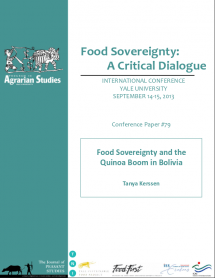Ideas into movement
Boost TNI's work
50 years. Hundreds of social struggles. Countless ideas turned into movement.
Support us as we celebrate our 50th anniversary in 2024.

Bolivia has made great strides towards incorporating food sovereignty into its legal framework and political discourse. Nonetheless, tensions remain between the discourse of food sovereignty and how it plays out on the ground

Bolivia has made great strides towards incorporating food sovereignty into its legal framework and political discourse. Nonetheless, tensions remain between the discourse of food sovereignty and how it plays out on the ground — particularly in indigenous territories which have been historically marginalized within the state. This paper examines the history and contemporary development of a commercial quinoa sector in the sou thern altiplano of Bolivia.
Risk management and dietary diversity in Andean food systems has always gone hand in hand with the ayllu system, based on reciprocity, communal resource management, and access to foods produced in various ecological zones. Vari ous waves of colonial and post colonial development either destroyed this system or condemned it to the most country’s most marginal lands such as the southern altiplano.
This marginalization paradoxically served to maintain a degree of autonomy vis à vis the state. In the 1980s, the convergence of mechanization, new migration patters, trade liberalization and community organization created export market opportunities for quinoa — a protein rich grain produced in indigenous agro pastoral systems in the south ern altiplano. Increased income from quinoa in a region with few on farm or off farm income earning opportunities has helped peasants stay on the land and spurred a “repeasant ization” of the region.
However, this has led to new challenges — namely, resource pressures and the erosion of communal land man agement and ayllu governance. As both a flagship product in the country’s development plan, and a crop produced by indigenous peasants, quinoa helps to illustrate the social, political and ecological contradict ions inherent to food sovereignty discourse and practice in the country, and its development model more broadl
Tanya Kerssen, Research Coordinator, Food First/Institute for Food and Development Policy Tanya Kerssen is the author of Grabbing Power: The New Struggles for Land, Food and Democracy in Northern Honduras (Food First Books, 2013) and is currently researching Bolivia’s quinoa export boom and its implications for highland peasant communities and food sovereignty.
Food Sovereignty: a critical dialogue, 14 - 15 September, New Haven.